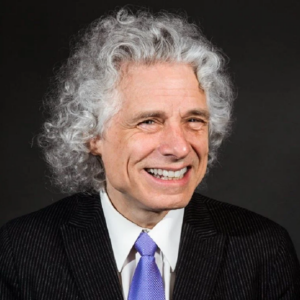Steven Pinker is the Harvard College Professor and Johnstone Family Professor of Psychology at Harvard University. He has also served on the faculties of MIT and Stanford University. Dr. Pinker is an experimental psychologist who is interested in all aspects of language and mind, particularly language development in children. After focusing fifteen years of research on the distinction between irregular verbs and regular verbs, he wrote a monograph that analyzed 20,000 past-tense forms in children’s speech, concentrating on errors like “bringed” and “holded” that reveal children’s linguistic creativity at work. In 1994 he published his first of five books written for a general audience. The Language Instinct introduced the idea that language is a biological adaptation. He then published in 1997 How the Mind Works, which offered a similar synthesis of the rest of the mind, from vision and reasoning to the emotions, humor, and art. In 1999 he finished Words and Rules: The Ingredients of Language, which presented his research on regular and irregular verbs as a way of explaining how language works in general. In 2002 he published The Blank Slate: The Modern Denial of Human Nature, which explored the political, moral, and emotional colorings of the concept of human nature. His most recent book is The Stuff of Thought: Language as a Window into Human Nature, published in 2007, in which he argues that the meaning of the words we use depend on a framework of basic cognitive concepts. Pinker frequently writes for the popular press on subjects ranging from politically correct language to the genetic enhancement of human beings. He has written for the New York Times, Time Magazine, and other periodicals on the subject of language, politics, and the genetic enhancement of human beings.
Pinker serves on numerous editorial and advisory boards, including the Usage Panel of The American Heritage Dictionary and the scientific advisory board for “The Decade of Behavior.” He has won many prizes for his books (including the William James Book Prize three times, the Los Angeles Times Science Book Prize, and the Eleanor Maccoby Book Prize from the American Psychological Association), his research (including the Troland Research Prize from the National Academy of Sciences and the Henry Dale Prize from the Royal Institution of Great Britain), and his graduate and undergraduate teaching. He is an elected Fellow of the American Academy of Arts and Sciences, the 2006 Humanist of the Year, winner of the 2008 Innovations for Humanity Award from La Ciudad de las Ideas in Mexico, and the recipient of six honorary doctorates.

